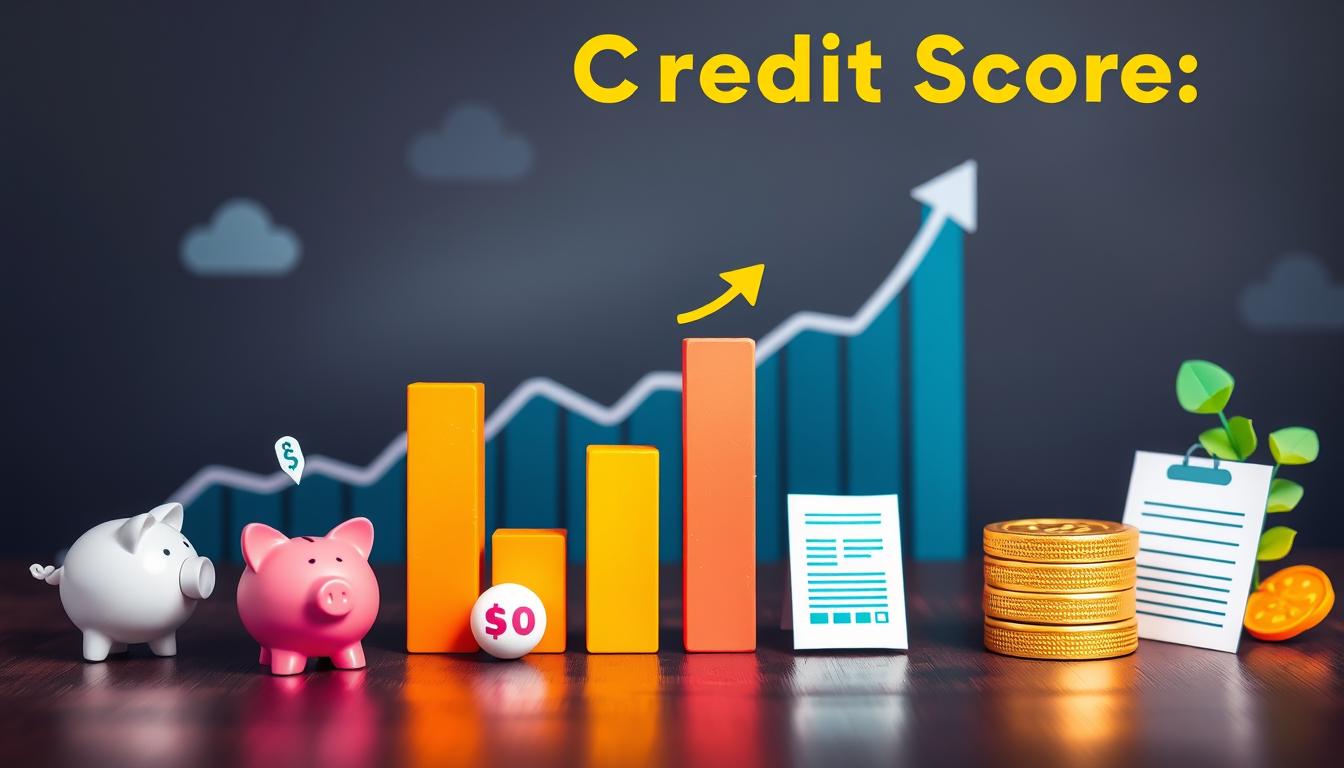Want to unlock the secrets to a great credit score? Say goodbye to financial roadblocks. The average U.S. credit score is around 718. It’s time to aim higher.
Your credit score affects loans, credit cards, and interest rates. It’s key to your financial health. But, many struggle to boost their score. What are the best ways to improve and even boost your score?
Improving your credit score is not just luck. It’s a mix of skill and knowledge. I’ll share seven strategies to help you improve your score. Your payment history and amounts owed are key.
Don’t worry, these tips are real and can help fast. You can become an authorized user or manage your debts well. I’ll show you how each step can change your score. Are you ready to improve your score? Follow these seven steps to a better FICO® Score.
Make On-Time Payments Consistently
When we talk about creditworthiness, one thing is clear. Your payment history is key, making up about 35% of your credit score. By focusing on this, you can boost your credit score and improve your finances.
To keep up with timely payments, which are key for better credit, try these strategies:
Set Up Automatic Payments
Setting up automatic payments is a simple way to avoid late fees. It ensures you make at least the minimum payment on time. Most banks offer auto-pay through their websites or apps.
Use Calendar Reminders
If you like managing things yourself, calendar reminders are a good choice. Set reminders a few days before each payment is due. This way, you’ll never forget to pay on time.
Benefits of Experian Boost
Experian Boost can also help improve your payment history. It lets you add utility and rent payments to your credit report. This can raise your credit score.
Remember, making payments on time is more than just avoiding penalties. It’s a step towards a better financial future. Try these tips and see your credit score improve over time.
Reduce Your Credit Utilization Ratio
Learning to manage your credit utilization ratio is key to boosting your credit score. This is important because it can affect up to 30% of your score. FICO and VantageScore models use it as a big factor.
Here are some ways to improve your credit score by managing your credit utilization.
Pay More Than the Minimum
Just paying the minimum isn’t enough for good credit health. Paying more than the minimum helps pay down debt faster. This lowers your utilization rate.
For example, if you owe $400 on a $1,000 limit, paying down to $200 cuts your utilization from 40% to 20%. This makes a big difference in how credit bureaus see you.
Request Higher Credit Limits
When you can, ask for higher credit limits. This doesn’t mean you should spend more. Instead, keep or lower your balance to boost your borrowing power.
Going from a $1,000 to a $2,000 limit, with a $400 balance, halves your credit utilization. This helps improve your credit score.
Understand Impact on Score
High credit utilization can hurt your score a lot. The best rate is 30% or less. Anything above starts to hurt your score.
Keeping your rate just above 0% but below 30% is good. It shows you’re responsible to creditors and scoring systems.
Knowing when your credit card issuer reports to the bureaus is key. Paying before the report date helps keep your balance low. This improves your credit score.
Regularly check your credit, before applying for new credit. This helps you stay on top of your finances. It also helps you avoid score drops from high utilization.
By using these strategies, you’re on your way to better credit scores. This opens up more financial options for you in the future.
Strategically Manage Your Credit Accounts
Improving your credit score starts with managing your credit accounts well. It’s not just about paying bills. It’s also about how you handle your accounts to boost your score. Let’s look at some smart steps you can take.
Keeping a good credit history is key to a higher credit score. It’s important to keep your oldest accounts open. This shows you’re financially responsible over time.
By keeping these accounts active, even with small transactions, you help your score. Closing them can hurt your score.
- Utilize high limit accounts sparingly: High credit use can hurt your score. Try to keep balances low. Pay more than the minimum when you can. For big debts, think about balance transfer cards or debt consolidation loans.
- Keep varying types of credit: This helps your score and protects it from big changes.
Every credit account tells a story. Good management shows you’re reliable and responsible. Credit repair services can help, but managing each account well is key. Check your credit report often for errors and fix them fast.
Managing your credit accounts well means finding the right balance. By doing this, you’re on your way to a better credit score. This leads to a stable and prosperous financial future.
Diversify Your Credit Portfolio
To really boost your credit score, think about mixing up your credit types. Having both revolving and installment credit shows you’re good with money. This mix not only widens your credit experience but also helps your score by showing lenders you can handle different credits well.
Mix of Revolving and Installment Credit
Knowing how to improve your credit score involves the types of credit you have. It’s smart to have a mix of revolving and installment credits. Experian says this mix can really help your score.
For example, the Capital One Platinum Secured Credit Card is easy to get. It starts with a $200 limit and a small deposit. This card is great for adding revolving credit to your mix, which is good for your credit history.
Risks of Overextending
- When you’re trying to improve your score by diversifying, be careful. Don’t open too many accounts at once. This can hurt your score because of all the hard inquiries.
- Improving your score means knowing your limits. Don’t take on more credit than you can pay back on time. This could harm your score instead of helping it.
It’s key to find the right balance between diversifying your credit and managing it well. While mixing up your credits is good, don’t forget to watch your credit commitments. Make sure they help your credit history without causing financial problems.
Limit Your Credit Inquiries
Knowing how credit inquiries affect your score is key. Each credit application adds a hard inquiry to your report, which can lower your score. A single inquiry might not hurt much, but many in a short time can really drop your score.
To improve your credit, manage these inquiries well. This means timing your applications right and choosing soft inquiries when you can.
Pre-qualification vs. Hard Inquiries
Pre-qualification is a soft inquiry that doesn’t hurt your score. It’s great for checking what you might qualify for without risking your score. On the other hand, a hard inquiry happens when a lender checks your credit for a loan. This can slightly lower your score.
Knowing the difference helps you plan your applications better. This way, you can avoid lowering your score too much.
Timing Your Applications
To not hurt your score too much, time your applications right. For example, when looking for a car loan or mortgage, apply within 14 to 45 days. This way, credit scoring models like FICO don’t count each inquiry separately.
This smart approach helps you find the best rates without hurting your score too much. It’s a good way to improve your credit over time.
- Limit applications to when absolutely necessary.
- Seek pre-qualification options to gauge without impacting your score.
- Consolidate related credit inquiries within short, specific periods to take advantage of deduplication rules in credit scoring.
By using these strategies and understanding credit inquiries, you can boost your financial health. This way, you won’t hurt your efforts to raise your credit rating.
Dispute Any Inaccuracies on Your Credit Reports
To improve your credit score, check your credit reports for errors. Wrong info can really hurt your score. Here’s how to fix mistakes, a key part of fixing your credit.
Regularly Review Your Credit Reports
It’s important to check your credit reports often. You can get one free report from each of the three big bureaus (Experian, Equifax, and TransUnion) every year. Now, you can get your reports for free every week.
How to File a Dispute
- Identify the inaccuracies: Look over each part of your credit reports. Mark any old, wrong, or strange entries.
- Gather documentation: Get any proof you have. This might be bank statements, letters, or payment records.
- Submit your dispute: Write a clear letter about the mistake. Include your info, explain the error, and attach your proof. Send it to the credit bureau and the person who gave the info using certified mail.
- Follow up: The bureau will check it usually in 30 days. If they fix it, they’ll update your report and send you a new copy for free.
Monitoring for Identity Theft
Identity theft can cause wrong info on your report. If you think someone has stolen your identity:
- Report it right away to IdentityTheft.gov.
- Tell the credit bureaus and ask for a fraud alert on your reports.
- Keep watching your reports to make sure no more fake stuff shows up.
By following these steps, you can improve your credit score. This helps you get better interest rates and terms. Fixing errors is not just your right, it’s a powerful way to fix your credit.
Become an Authorized User
Want to boost your credit score? Becoming an authorized user on someone else’s credit card might help. This is best if the account has a good payment history and low credit use. We’ll look at how to pick the right account and the risks and benefits.
Selecting the Right Account
Choosing the right account is key. Look for one with a long history of on-time payments and low credit use. You don’t need a credit check to join, making it a good option for beginners or those rebuilding credit.
Understanding the Risks and Benefits
- Immediate Impact: Your credit score can improve quickly as an authorized user. This happens if the primary user pays on time and uses credit wisely.
- Risks Involved: Late payments can hurt your score too. Talk openly with the primary user about their credit habits.
- Building Your Credit: It’s great for those with little credit history. It helps build a strong credit foundation.
- Long-Term Benefits: Good credit habits can lead to better credit offers later on. This includes lower interest rates and easier loan approvals.
In summary, being an authorized user is a big responsibility but can help improve your credit. Choose an account that will help your financial journey towards better credit.
Conclusion
Understanding credit scores is key to better financial health. Over 90% of top lenders use FICO scores. Managing your payment history can greatly improve your score.
Your credit utilization ratio is also very important. Keeping it under 30% can help a lot. Being an authorized user on a good account can also boost your score.
I’ve shared tips to help improve your credit score. For those with thin credit files, these tips can help a lot. Regular, responsible credit behavior is essential for a better financial future.







